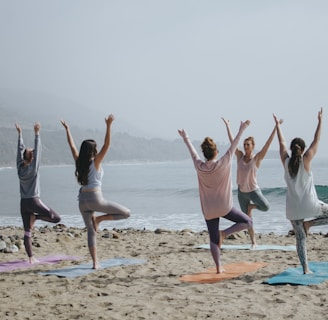Crafting Wellness Retreats: A Comprehensive Guide for Travel Agents
Discover how to craft wellness retreats that boost client loyalty, increase bookings, and enhance well-being. This guide offers valuable insights for travel agents looking to tap into the growing wellness market.
8/27/20246 min read


In today’s fast-paced world, the demand for wellness travel has skyrocketed. People are increasingly seeking to combine their need for rest and relaxation with opportunities for personal growth, healing, and rejuvenation. Wellness retreats offer the perfect blend of these experiences, making them a highly sought-after option for travelers. For travel agents, crafting wellness retreats not only meets this growing demand but also provides an opportunity to build strong, loyal client relationships and create memorable travel experiences. This comprehensive guide will explore the ins and outs of designing wellness retreats, highlighting how these packages benefit both travel agents and their clients.
Understanding the Wellness Travel Market
Before diving into the specifics of crafting wellness retreats, it’s essential to understand the broader wellness travel market. Wellness travel is a segment of the tourism industry focused on enhancing or maintaining personal well-being. This can include a variety of experiences, such as spa treatments, yoga sessions, meditation workshops, fitness activities, nutrition classes, and even digital detoxes.
The global wellness tourism market has been growing at an impressive rate, with an increasing number of travelers prioritizing their health and well-being while on vacation. According to the Global Wellness Institute, wellness tourism is expected to continue its rapid growth, outpacing the broader tourism industry. This trend presents a lucrative opportunity for travel agents who can tap into this market by offering tailored wellness retreats.
The Benefits of Wellness Retreats for Travel Agents
High-Value Bookings: Wellness retreats often come with premium price tags due to the specialized services and experiences they offer. This means higher commission rates for travel agents, making wellness retreats a lucrative segment to focus on.
Client Loyalty: Wellness travel often involves deeply personal experiences that can lead to strong emotional connections with the destination and the travel agent. By providing clients with transformative wellness experiences, travel agents can build long-lasting relationships and foster client loyalty.
Market Differentiation: As wellness tourism continues to grow, travel agents who specialize in crafting unique wellness retreats can differentiate themselves from competitors. Offering bespoke wellness packages sets agents apart in a crowded market.
Repeat Business: Wellness retreats are often seen as essential for maintaining a healthy lifestyle, leading to repeat bookings. Clients who experience the benefits of wellness travel are likely to return for more, providing agents with a steady stream of repeat business.
Referrals: Satisfied clients are more likely to refer friends and family to the travel agent who crafted their wellness retreat. Word-of-mouth marketing is powerful in the travel industry, and wellness retreats can generate positive buzz and referrals.
Key Components of a Successful Wellness Retreat
Designing a successful wellness retreat requires a deep understanding of your client’s needs and preferences, as well as careful consideration of various elements that contribute to a holistic experience. Below are the key components that travel agents should focus on when crafting wellness retreats:
Location Selection:
Serene Environment: The location of the retreat is one of the most critical factors. Choose destinations known for their natural beauty, tranquility, and serene environment. Mountains, beaches, and secluded countryside are popular choices.
Accessibility: While the location should be remote enough to provide a peaceful atmosphere, it should also be accessible to travelers. Consider proximity to airports and ease of transportation.
Local Culture: Incorporate the local culture and traditions into the retreat. For example, a retreat in Bali might include Balinese healing rituals, while one in Japan could offer traditional onsen (hot spring) experiences.
Accommodations:
Comfort and Luxury: Wellness retreats often appeal to travelers looking for comfort and luxury. Choose accommodations that offer premium amenities such as spa services, organic meals, and comfortable living spaces.
Sustainable Practices: With the rise of eco-conscious travelers, selecting accommodations that prioritize sustainability can enhance the appeal of the retreat. This can include eco-friendly lodging, locally sourced organic food, and waste reduction practices.
Wellness Programs:
Customized Wellness Plans: Tailor wellness programs to meet the specific needs of your clients. This could include a mix of yoga, meditation, fitness classes, and nutritional counseling.
Expert Instructors: Partner with certified wellness professionals, such as yoga instructors, nutritionists, and holistic therapists, to provide high-quality, authentic experiences.
Holistic Approach: Offer a variety of wellness activities that cater to the mind, body, and spirit. This might include guided nature walks, mindfulness meditation sessions, detox diets, and spa treatments.
Culinary Experience:
Healthy Cuisine: The food offered at a wellness retreat should align with the principles of health and well-being. Opt for organic, locally sourced ingredients and menus designed by nutritionists.
Cooking Classes: Consider including cooking classes in the retreat program, where participants can learn how to prepare healthy meals that they can incorporate into their daily lives after the retreat.
Cultural and Spiritual Immersion:
Local Experiences: Incorporate activities that allow participants to connect with the local culture and spirituality. This might include visits to local temples, participation in traditional ceremonies, or learning about indigenous healing practices.
Mindfulness Practices: Include mindfulness practices such as meditation, journaling, and nature immersion to help participants cultivate a deeper sense of inner peace and self-awareness.
Digital Detox:
Technology-Free Zones: Encourage participants to disconnect from their devices by offering technology-free zones or scheduled times for a digital detox. This can help them fully immerse in the wellness experience.
Personalized Service:
Concierge Service: Offer personalized concierge services to cater to individual needs and preferences. This can include arranging private sessions with wellness experts, customizing meal plans, or organizing bespoke activities.
Pre- and Post-Retreat Support: Provide guidance and support before and after the retreat to help clients prepare for and integrate their experiences into their daily lives. This might include pre-retreat consultations and follow-up wellness plans.
Marketing and Selling Wellness Retreats
For travel agents, the success of a wellness retreat lies not only in the design but also in the marketing and selling of the experience. Here are some strategies to effectively market and sell wellness retreats:
Targeted Marketing: Focus your marketing efforts on specific demographics, such as health-conscious individuals, corporate clients, or yoga enthusiasts. Use social media platforms, email newsletters, and wellness blogs to reach your target audience.
Content Marketing: Create engaging content that highlights the benefits of wellness retreats. This could include blog posts, videos, client testimonials, and photo galleries. Showcase the unique aspects of the retreat, such as the location, wellness programs, and cultural experiences.
Collaborations: Partner with wellness influencers, yoga studios, gyms, and wellness brands to promote your retreats. Collaborative marketing can help you reach a wider audience and build credibility in the wellness community.
Referral Programs: Offer referral programs to incentivize past clients to refer new clients. This could include discounts on future retreats or complimentary wellness services.
Client Testimonials: Collect and share testimonials from past participants who have experienced the positive effects of your wellness retreats. Authentic, positive reviews can significantly influence potential clients’ decisions.
Special Offers: Consider offering early-bird discounts, group rates, or package deals to attract bookings. Limited-time offers can create a sense of urgency and encourage clients to book sooner rather than later.
Personalized Recommendations: Use your knowledge of clients’ preferences to recommend specific wellness retreats that align with their interests and needs. Personalized service is key to building trust and ensuring repeat business.
The Benefits of Wellness Retreats for Clients
Wellness retreats offer numerous benefits to clients, making them an attractive option for travelers seeking more than just a vacation. Here’s how clients can benefit from participating in a wellness retreat:
Stress Relief: Wellness retreats provide an opportunity to disconnect from the stresses of daily life and focus on relaxation and self-care. The serene environments and calming activities help reduce stress levels and promote mental well-being.
Personal Growth: Many wellness retreats include workshops and activities designed to foster personal growth and self-discovery. Clients can return home with new skills, insights, and a renewed sense of purpose.
Physical Health: Wellness retreats often focus on improving physical health through activities such as yoga, fitness classes, and healthy eating. Participants can experience weight loss, increased energy levels, and improved overall health.
Emotional Healing: For those dealing with emotional challenges, wellness retreats offer a supportive environment for healing. Practices such as mindfulness, meditation, and therapy sessions can help clients process emotions and find inner peace.
Social Connections: Wellness retreats often bring together like-minded individuals who share similar interests and goals. This creates opportunities for clients to form meaningful connections and build supportive relationships.
Digital Detox: The digital detox component of many wellness retreats allows clients to unplug from technology and reconnect with themselves and nature. This break from constant digital stimulation can lead to greater clarity and focus.
Cultural Enrichment: By immersing themselves in the local culture and traditions of the retreat location, clients gain a deeper appreciation and understanding of different ways of life. This cultural enrichment enhances the overall travel experience.
Conclusion
Crafting wellness retreats is not just about providing a vacation; it’s about creating transformative experiences that nourish the mind, body, and spirit. For travel agents, wellness retreats offer a unique opportunity to tap into a growing market, differentiate their services, and build lasting relationships with clients. By carefully curating each element of the retreat and focusing on personalization, travel agents can create unforgettable wellness experiences that leave a lasting impact on their clients.
